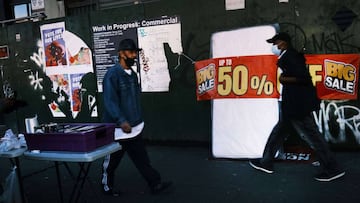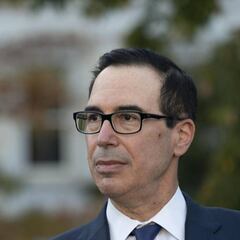Unemployment benefits NY: why was New York denied an extra $300?
With the Republicans and the Democrats still unable to agree a second covid-19 stimulus package many Americans are being left without financial support.


A request from New York State for an additional round of federal funding to provide $300 weekly unemployment benefits has been denied. The federal government had extended New York’s Lost Wages Assistance Program for an extra six weeks but with a new covid-19 stimulus package far from agreed the scheme has had to end.
Peter Brancato, the state’s Labor Department spokesman, claimed that the refusal is an example of failings in the Federal Emergency Management Agency’s economic response to the pandemic:
“FEMA has denied New York’s request for additional weeks of LWA funding beyond the six weeks that have already been distributed — highlighting one of the many shortcomings of this slapdash Federal program.”
Second stimulus package update: US coronavirus relief bill
Why was the request turned down?
The CARES Act, signed into law back in March, provided federal funding for $600 weekly payments for anyone who had lost their job because of the coronavirus pandemic. The $1.8 trillion package provided direct aid to individuals and businesses but despite being the largest of its kind in American history it has now essentially ran out.
@senatemajldr has advised the White House not to strike a deal with Speaker Nancy Pelosi on a new stimulus bill before Election Day, he told Republican senators privately today.
— Nicholas Fandos (@npfandos) October 20, 2020
As 1st reported by @ericawerner @JStein_WaPohttps://t.co/vdaJOH9KYd
President Donald Trump, the Democrat-led House of Representatives and the Republican-led Senate have attempted to find a common ground on a second stimulus package but so far their efforts have been fruitless. On Tuesday Senate Majority Leader Mitch McConnell advised the White House not to pass a significant stimulus bill until after the election.
Without another large-scale financial relief package the federal government is not able to provide the $600 unemployment benefits or even the $300 payments made in recent months. The failure to agree a new bill is, according to Brancato, the fault of the White House and Senate Republicans:
“Across New York and around the country, families are still reeling from the economic impact of the Covid-19 pandemic, and the continued failure by the Trump Administration and Senate Republicans to negotiate a comprehensive relief bill is as illogical as it is harmful.”
New York feels the brunt of coronavirus fallout
Our new battleplan on the COVID warfront: Andrew Cuomo lays out New York’s strategy to defeat the virushttps://t.co/psNUo57aw2
— New York Daily News (@NYDailyNews) October 25, 2020
New York State was at one point one of the areas worst-affected by covid-19 in the whole world. Nearly half a millions cases have now been recorded and over 30,000 have tragically lost their lives.
As well as the human cost the economic consequences have been catastrophic with 537,675 New Yorkers applying for the Pandemic Emergency Unemployment Compensation in the week ending 3 October. That number was a considerable rise from the 433,446 recorded the week previously and with a two-week data lag on claimant data it seems likely that figure will only grow without further support.
When will the next round of unemployment benefits arrive for New Yorkers?
Speaker of the House Nancy Pelosi has been trying to get the $2.2 trillion HEROES Act signed into law since it passed the House but it looks unlikely to go any further due to considerable resistance from the Republicans.
Senate Democrats block slimmed-down GOP coronavirus bill as talks continue https://t.co/W1Xdr4MYvP
— CBS News (@CBSNews) October 21, 2020
Related stories
The Republican-led Senate has attempted to pass a $500 billion “skinny” relief bill which would have included further funding for unemployment benefits, schools and a Payment Protection Program but it was blocked last Wednesday by Senate Democrats in favour of their more comprehensive bill.
It looks like a compromise will not be made in the remaining 11 days before Americans go to the polls so many will now be wondering about a post-Election Day bill. A study carried out by Deutsche Bank found that a Biden presidency and Democrat-held Senate would bring the best prospect for a second covid-19 stimulus bill. They predict the imminent passing of a package worth around $2 trillion which could help lower the unemployment rate by nearly 2 percentage points.

